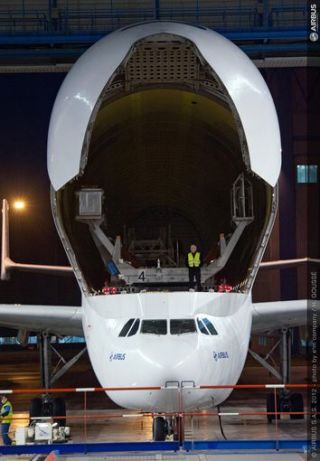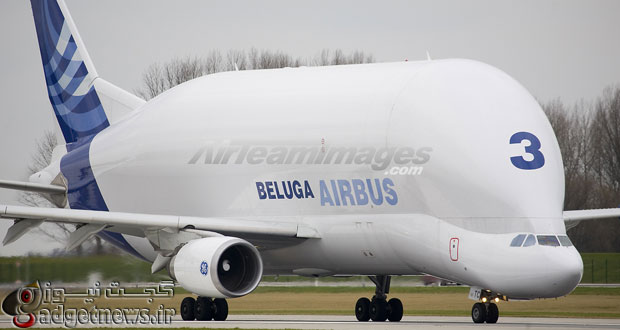این هواپیمای غولآسا که به نام «Beluga» (نهنگ سفید) معروف است، شاید زیباترین پرندهی آسمانها نباشد، اما ظرفیت باربری ۴۷ تُنی آن کاملاً این بدقیافگی را جبران میکند. نام رسمی آن Airbus A300-600ST است و یکی از بزرگترین هواپیماهاییست که تا کنون پرواز کردهاند.
ایرباس نخستین نمونهی این هواپیما را در سال ۱۹۹۴ طراحی کرده و ساخت تا جایگزین Boeing Super Guppyهای قدیمی شود و در آن زمان خود ایرباس هم – با نارضایتی – ناچار بود برای انتقال قطعات میان کارخانههایش در سرتا سر اروپا از آن استفاده کند. حالا نهنگ سفید ایرباس هر هفته بیش از ۶۰ پرواز را میان ۱۱ کارخانه انجام میدهد.
 واضح است که بلوگا بر اساس شاسی یک ایرباس A300 ساخته شده اما برای این که بتواند محمولههای سنگین تری جا به جا کند، تغییراتی در آن صورت گرفته : قسمت فوقانی هواپیما برداشته شده و اتاقکی پهنتر که شبیه به حباب است جایگزین آن شده؛ همچنین کابین خلبان پایینتر آمده و درب تاشویی به قسمت بدنهی جدید اضافه شده تا بارگیری به جای قسمت عقب هواپیما، از جلو صورت گیرد.
واضح است که بلوگا بر اساس شاسی یک ایرباس A300 ساخته شده اما برای این که بتواند محمولههای سنگین تری جا به جا کند، تغییراتی در آن صورت گرفته : قسمت فوقانی هواپیما برداشته شده و اتاقکی پهنتر که شبیه به حباب است جایگزین آن شده؛ همچنین کابین خلبان پایینتر آمده و درب تاشویی به قسمت بدنهی جدید اضافه شده تا بارگیری به جای قسمت عقب هواپیما، از جلو صورت گیرد.
این هواپیما که ۵۶ متر ارتفاع دارد و عرض آن با احتساب طول بالها به ۴۵ متر میرسد، دارای گنجایش قریب به ۴۲۵۰ متر مکعب است اما موتور چندان قدرتمندی ندارد و به این ترتیب برای جابهجایی محمولههای عظیم ولی سبک وزن مناسب تر است. در حالی که بیش از بیست سال از عمر این ناوگان میگذرد، این هواپیماها کمکم به دوران بازنشستگیشان وارد میشوند اما آنقدر مفید بودهاند که ایرباس از حالا عملیات تبدیل پنج A300 دیگر به نسل جدید این باربران عظیم را آغاز کرده است. ناوگان جدید تا سال ۲۰۱۹ به کار افتاده و تا سال ۲۰۲۵ که ناوگان قدیمی بازنشست میشود ، در کنار آن فعال خواهد بود.
منبع : gizmodo
This Plane That Carries Planes Costs a Quarter of a Billion Dollars
This Plane That Carries Planes Costs a Quarter of a Billion Dollars
With a front end like Megamind’s noggin, this massive airliner may not be the prettiest of airplanes but her whopping 47 ton cargo capacity more than makes up for her homeliness. Popularly known as the “Beluga,” this super-capacity transport helps keep the European aviation industry in the air. It’s a whale of a plane.
Officially known as the Airbus A300-600ST (Super Transporter), it’s one of the largest planes to ever take to the skies. Airbus designed and built the first of the five Belugas currently in service back in 1994 as a replacement for the outdated Boeing Super Guppy that Airbus, much to its chagrin, had to employ for toting parts between its various factories throughout Europe. These days, Airbus’ Beluga pod makes more than 60 flights between 11 factory sites every week.
The Beluga is, obviously, based on the Airbus A300 chassis but has been heavily modified for use as a heavy transport aircraft. Designers chopped off the top of the aircraft, replacing it with a wider, bubble-shaped fueselage. They also lowered the cockpit and added a hinge to the new fuselage section so that the plane could be loaded from the front, rather than the rear.
The plane itself is 184 feet long with a 147-foot wingspan and is powered by a pair of 27,000 lbf GE CF6-80C2A8 turbofans. These aren’t particularly powerful engines by any means—the P&W PW4000, which is also commonly used on A300s offers three times the thrust—and, combined with the airplane’s 150,000 cubic foot interior makes the Beluga ideal for transporting oversized, yet lightweight, items. Its cavernous maw is so large, in fact, that it can carry a pair of fully-assembled A340 wings or an entire fuselage section of the new A350. Though, with an estimated construction and conversion cost of about $285 million, it had damn well better.
With more than 20 years of service to its name, the current fleet of Beluga is beginning to reach the end of its operational lifespan. But the planes that make it up have proven so useful that Airbus has already begun converting another five A300’s into a new generation of Super Transporters. The new fleet is expected to come online by 2019 and operate alongside the existing fleet until the older models begin being retired around 2025.
 گجت نیوز آخرین اخبار تکنولوژی، علم و خودرو
گجت نیوز آخرین اخبار تکنولوژی، علم و خودرو 











